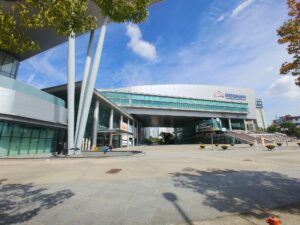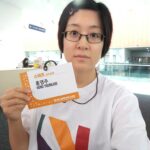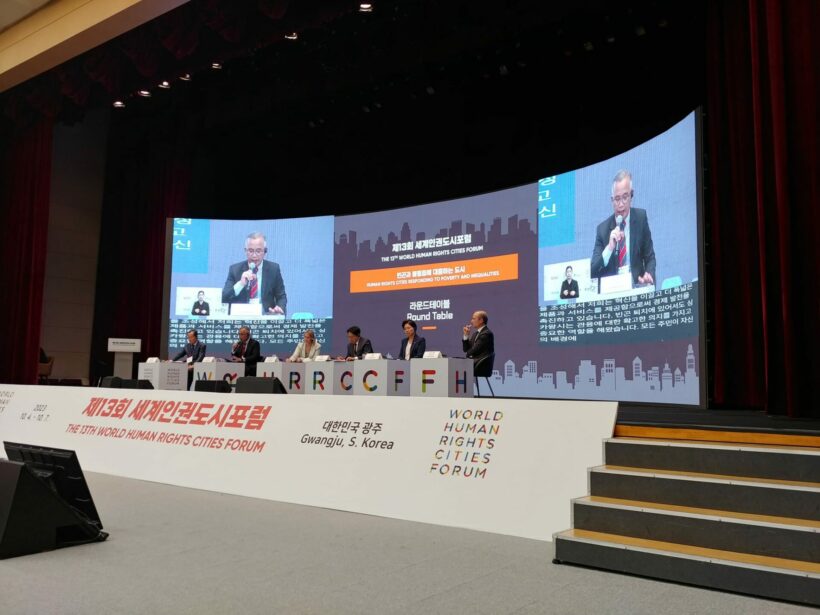October 4-7, 2023. The South Korean city of Gwangju hosted the 13th World Human Rights Cities Forum (a live and online forum) at Kimdaejung Convention Centre.

This year, the theme was ‘Human Rights Cities Responding to Poverty and Inequalities’, which has helped the participants to focus on the recent human rights issues and major problems caused by poverty and inequalities through a human rights-based approach. Gwangju is the sixth-largest metropolis city in the southwest corner of South Korea. It is known for a pro-democracy uprising in 1980.
KANG Gi-jung, Gwangju City’s Mayor, in his greeting message, said, “Currently, more than half of the world’s population lives in cities. Therefore, the issues of the world are also the issues of cities. The causes of various problems such as human rights, climate crisis, and social polarization, as well as their solutions, can be also found in cities.
The World Human Rights Cities Forum, which we initiated in 2011 to share the spirit of the May 18 Democratization Movement of 1980 and the experiences of human rights cities, has now grown into an important platform for cities and human rights experts around the world to discuss various human rights issues and seek solutions together. The theme of this year’s forum is “Human Rights Cities Responding to Poverty and Inequality”. Based on this theme, the forum participants will address the issues of poverty and inequalities that are intensifying due to diverse challenges such as COVID-19, climate crisis, various conflicts, and wars among others.”
According to the information obtained from the forum’s website, the World Human Rights Cities Forum
(WHRCF) has been held in Gwangju, Republic of Korea, since 2011 as an annual event, with the aim of
realizing the vision of a human rights city. The Forum has become a gathering place to share the spirit of
justice and community, the same values under which the citizens of Gwangju resisted the ruthless oppression of the military regime in May 1980. WHRCF has been expanding its network to involve human rights city officials, human rights organizations, activists, and miscellaneous stakeholders in the area of human rights, both in Korea and abroad. WHRCF has grown to be a major human rights event and a distinctive platform leading to international cooperation and the exchanging of experiences on challenges and achievements of human rights cities to protect and institutionalize citizens’ human rights in everyday life.
international organizations, human rights experts, and future generations came together to discuss ‘Human Rights Cities Responding to Poverty and Inequalities’, focusing on the four main issues. First, how are poverty and inequalities connected with human rights? Second, what are the current human rights agenda and issues arising from poverty and inequalities? Third, what are the new strategies and measures of human rights cities to respond to poverty and inequalities? Fourth, how can we enhance the human rights solidarity among human rights cities to respond to poverty and inequalities?
Participants also explored the ways of collaboration in finding effective human rights-based approaches
at the local level to reduce poverty and inequalities, while at the same time exploring common implementation strategies at the global level so that these can be reflected in the implementation of the Sustainable Development Goals, in the resolutions of the UN Governing Bodies such as the UN Human
Rights Council and not least, in the shaping of a New Social Contract.

Alice Hong Youngjoo, a volunteer staff member during the forum, told Pressenza “There were various lectures on human rights that were held in Korean and English. Some important key figures from organizations such as the UN and UNESCO were there to speak. During the 1980s, an incident occurred in Gwangju where the government used military forces to massacre innocent civilians who were protesting at the time. This was what led the city of Gwangju to develop a forum related to human rights. To this day, you can see the impact the massacre had on the city. Unfortunately, many people have forgotten about that time and so this Forum is a way of remembering the meaning of human rights”.
The forum was attended by city mayors and international experts on global human rights issues, such as, Nada Al-Nashif UN Deputy High Commissioner, Gabriela Ramos Assistant Director-General for Social and Human Sciences, UNESCO, Sumastro Mayor, Singkawang, Indonesia, Karolina Zdrodowska Deputy Mayor, Warsaw, Poland, Vicki Felthaus Deputy Mayor, Leipzig, Germany and Morten Kjaerum Director, Raoul Wallenberg Institute.
Further information can be obtained: http://www.whrcf.org/
Photo credit: Alice Hong






